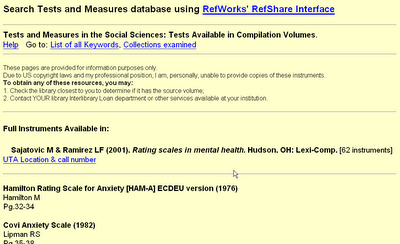Tests and Measures in the Social Sciences
Looking for Tests, Measures, and Inventories in the Library? Here's an Index
Every week someone e-mails me wanting tests and inventories hoping to measure everything from anxiety to the quality of the relationship between people who work together.A wonderful librarian, named Helen Hough, at Central Library at the University of Texas at Arlington indexed over 100 compilations that include tests, measures and inventories. It's set up as a live database, so you can type in the name (or subject) of the test you're interested in, and you'll get a list of results. Click on the one that looks most promising. Not only will you get a citation of the book, you'll also be told how much of the test is included.
So, for instance, if you're looking for the Acute Panic Inventory, type it in, plus "compilation volumes" as above. Then get Google results: (Click on the pictures to enlarge them.)

In this case, click on the link -- it's for the Acute Panic Inventory. And this is the result you'll get.
 It says that the entire test is included. And also lists all of the other tests included in the book.
It says that the entire test is included. And also lists all of the other tests included in the book.Sajatovic M & Ramirez LF (2001). Rating scales in mental health. Hudson, OH: Lexi-Comp. [62 instruments] UTA Location & call number (There's a link to look up the book in their library. It's nice for them, but not so helpful for us :-( If we don't have it, just ask to borrow it through ILL.
So just look up the book in our library catalog to see if we have it. In this case, it's at the Health Center Science Library (the Medical School Library) and can be checked out. Pretty cool! Made me happy when I found it.
[I'm delighted to add that Ms. Hough commented that there is "a lot more stuff in Refshare." That's the link above the Quick Search box. In that database she and her colleagues use RefWorks to gift us with even more information about the locations of tests and measures. When you get into Refshare, you can search for what you'd like by using the dropdown list under Search on the very left-most bit of the menu at the top of the page. (Choose Advanced -- That gives you the most options.) Again, enjoy yourselves!]
I mention the details about Ms. Hough because she has performed such a service to all of us. Thank you Ms. Hough. Thank you so much. You have already helped two of the librarians at the University of Florida within 2 days of finding out about your index. We grovel in thankfulness.


